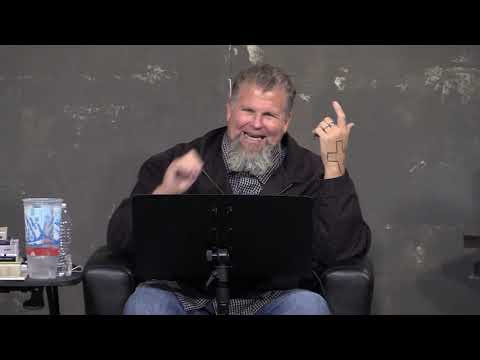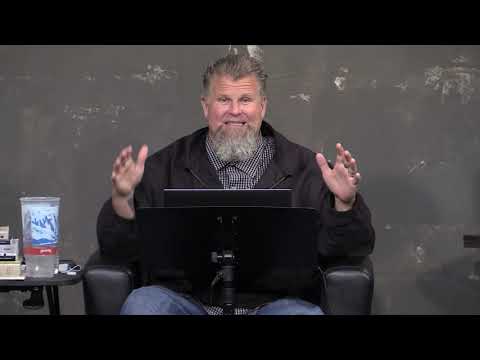
Blotted Out or Added In, Part 3
Shawn's teaching covers the "Book of Life," shifts in scriptural interpretation, challenges to traditional doctrines, his journey from Mormonism, and the importance of liberty.

Shawn's teaching covers the "Book of Life," shifts in scriptural interpretation, challenges to traditional doctrines, his journey from Mormonism, and the importance of liberty.

Script currently unavailable.

Shawn's teaching emphasizes Christian love, salvation through Christ, and contextual biblical interpretation. He links Revelation's locusts to Roman invasions, not future prophecy, and encourages personal spiritual engagement.

True freedom is found in Christ's teachings, not secular pursuits. Divine guidance offers liberation beyond worldly limits, growing through faith and Agape Love.

Jesus' presence in Matthew 18:20 supports structured church discipline. Shawn critiques literal New Testament application today, urging personal faith over institutional rules.

Shawn McCraney critiques Mormonism's "us vs. them" mindset, urging humility and reliance on God's grace over self-empowerment, contrasting with Christian humility.

Shawn McCraney critiques democracy in church governance, likening it to totalitarianism, and advocates for educated leadership, using Socratic philosophy and Christian Anarchism.

Shawn's teaching uses table-setting metaphors to illustrate God's reconciliation through Jesus, covering biblical events from Eden to Revelation, emphasizing spiritual transformation and direct connection with God.

Shawn McCraney warns against political entanglement for Christians, likening it to religious totalitarianism, advocating for personal freedom, individuality, and open dialogue.

Shawn McCraney teaches that pain is constant in life, marked by guilt from sin or alienation in faith, but spiritual growth lessens sin's grip, with God's constant support.

Shawn McCraney advocates Christian Anarchism, emphasizing liberty, individualism, and skepticism of power. He promotes personal faith, autonomy, and dismantling ecclesiastical authority.

Shawn teaches that God evaluates individuals based on free will and personal choices, removing external factors during judgment, focusing on intrinsic decisions and accountability.

Shawn McCraney advocates Christian Anarchy, critiquing religious authority and promoting individual liberty, personal faith, and non-hierarchical worship, free from institutional control.

Shawn McCraney teaches that the afterlife reflects true desires, emphasizing free will and personal responsibility. True believers seek a deep, eternal relationship with God.

Shawn McCraney emphasizes prayer's role in divine intervention, explores Christian anarchism, critiques state-led capitalism, and advocates for justified authority and equitable systems.

Shawn McCraney emphasizes God's supremacy and eternal nature, contrasting it with humans' evolving state. True devotion requires humility and recognizing God's superiority.

Shawn McCraney critiques the Trinity doctrine, arguing biblical passages were altered to support it. He highlights discrepancies in baptism practices, focusing on Jesus' authority.

Shawn McCraney views death as a birth into the afterlife, where biases persist temporarily. God is gentle, guiding individuals to truth at their own pace, aligning with 1 Timothy 4:10.

Shawn uses pizza's cultural impact to illustrate religious diversity, urging acceptance of varied beliefs. Faith is likened to unconditional love, essential for spiritual fulfillment.

Shawn critiques traditional Trinity views, arguing translations like 1 Timothy 3:16 were altered to support Trinitarianism, suggesting original texts don't equate Jesus with God.

Heart of the Matter shifts to pre-recorded episodes, focusing on ministry efforts. God's love is unconditional; afterlife reflects earthly beliefs. Justice and mercy prevail.

Shawn McCraney's journey shows that embracing inclusive Christian doctrines and love over dogma can lead to rejection by Evangelicals, paralleling Jesus' experience.

Suffering is universal, raising questions about God's nature. Shawn teaches that love and free will are key, emphasizing agape love beyond religious dogma.

Shawn McCraney teaches the power of words, linking them to life or harm, and stresses mindful speech. He equates negative emotions with destructive actions, urging introspection and kindness.

Script currently unavailable.

Shawn McCraney guides ex-Mormons to Christian freedom, critiques Trinitarianism, asserting Yeshua as unified God, challenging distinct personhood in the Godhead.

Shawn McCraney teaches that God reaches out to us, allowing events without always intervening, and recognizing His role in all aspects strengthens faith and understanding.

Shawn McCraney's project involves a verse-by-verse New Testament translation, focusing on Revelation. He highlights Yeshua as "the Lord God Almighty" on the throne, uniting Father, Son, and Holy Spirit.

Heaven is a realm of divine reunions, eternal rest, and selfless love, free from sin and fear, where believers spread God's message, focusing on outreach and selflessness.

Shawn McCraney teaches love and understanding beyond religious boundaries, emphasizing prayer for all, inherent worth, agape love, and spiritual growth through genuine faith.